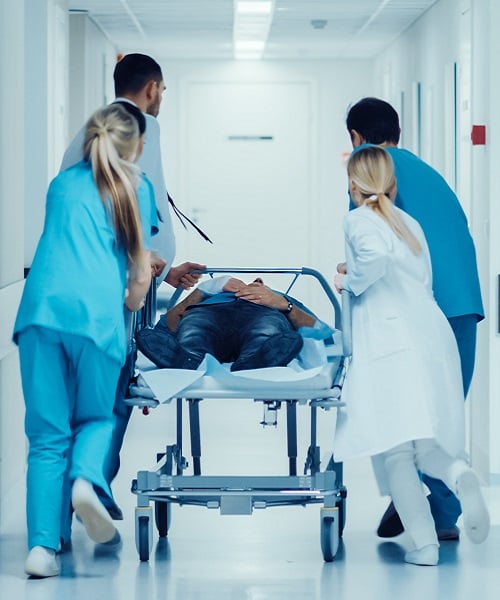Why Choose MetroHealth for Emergency Care?
We are the leader in Emergency medicine. No matter what type of medical emergency you have, we can take care of it right here. In fact, many other hospitals send their patients to our Emergency Department because of our proven capabilities.
If you believe your condition is life-threatening, call 911 or go to an emergency room near you.
We have locations in Brecksville, Cleveland Heights, Cleveland (Main Campus), and Parma.
ER or Express Care
The decision of whether to head to a neighborhood express care center or an Emergency Room relies in part on what is required to care for your problem.
Emergency Care
 An emergency department has the advantage of having more robust services and equipment, additional medical staff for consultations and more diagnostic capabilities. Also, if necessary, you most likely would be admitted to the same facility.
An emergency department has the advantage of having more robust services and equipment, additional medical staff for consultations and more diagnostic capabilities. Also, if necessary, you most likely would be admitted to the same facility.
If you have severe symptoms, have a complex medical history, require urgent extensive testing or are quite sure you should be hospitalized, head to an emergency room.
- Chest pain
- Trouble breathing
- Stroke
- Neck and spinal injury
- Seizure
- Severe burns
- Heavy bleeding
- Loss of consciousness
- Mental health emergency
- High speed injury (car or bike accident, steep fall, etc.)
- Head injury accompanied by nausea or vomiting, balance issues, change in eyesight, discharge of fluid from ear or nose, memory loss
Express Care
 A visit to a MetroHealth Express Care location has the advantage of being convenient – there are many throughout the community. Also, there is usually a shorter wait and a lower charge than at an emergency department.
A visit to a MetroHealth Express Care location has the advantage of being convenient – there are many throughout the community. Also, there is usually a shorter wait and a lower charge than at an emergency department.
Express care is a go-to for symptoms like a runny nose, cough, sore throat, earache or a sprain.
- Cough, cold, sore throat
- Ear pain or infection
- Fever or flu-like symptoms
- Allergic reaction (non-life threatening)
- Minor burns, injuries or cuts
- Stitches
- Insect bites
- UTI or yeast infection
- Pink eye
- Sprains or strains
Signs and Symptoms of a Stroke
Nothing is more important than time when someone is suffering a stroke. The sooner someone gets medical attention, the better the chances of recovery. The more minutes that pass – even 15 minutes – the more likely the chance of brain injury, permanent disability, even death.
Signs and symptoms of a stroke include:
- Tingling, numbness, weakness, or loss of movement in the face, arms or legs -- especially if it happens on only one side of the body.
- A drooping face.
- Loss of vision, double vision or blurry vision out of one or both eyes.
- Confusion, difficulty in thinking or finding the right word, memory loss.
- Slurred speech or trouble speaking or understanding simple statements.
- Severe headache with no apparent cause that feels different than other headaches.
- Problems with coordination, balance and walking.
Experts have come up with an easy way to remember things during a possible stroke. It’s the FAST test:
F is for Face: Have the person smile. Does one side of the face droop?
A is for Arms: Raise both arms. Does one arm stay lower or drop down?
S is for Speech: Does the person have slurred or strange speech?
T is for Time: If the answer is yes to any of these questions, don’t delay. Call 911 right away.
Subspecialists at a Moment's Notice
Our Emergency Room has access to many specialists, including:
- Orthopedic surgeons
- Cardiologists
- Neurologists
- Pulmonary critical care specialists
- Trauma surgeons
- Burn-care experts
- Obstetricians
- Critical care medicine experts
- Ophthalmologists
- Facial surgeons
- Psychiatrists
- SANE specialists
Our experts have experience treating all kinds of emergencies—from chest pain to stroke symptoms to food poisoning and everything in between.
And you can count on them to treat you compassionately and promptly, no matter what type of emergency you have. In addition to life-threatening emergencies, our experts provide rapid care for everyday emergencies—from cuts to broken bones.
